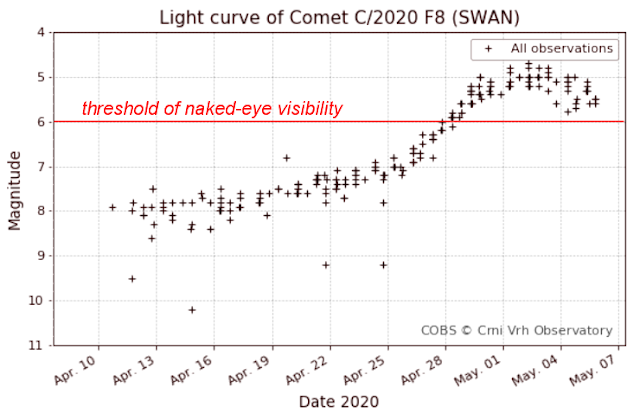This week, an unexpected outburst from Comet SWAN (C/2020 F8) amazed observers in the southern hemisphere, who could actually see the comet brighten with their unaided eyes.
What happened? It might have fragmented, exposing bright clouds of dusty gas to the sun. Certainly the comet's tail looks like debris from an explosion:
Comet SWAN photographed by Gerald Rhemann of Farm Tivoli, Namibia on May 1st.
But Karl Battams of the Naval Research Lab in Washington, DC, doesn’t think so. "Outbursts do not necessarily imply fragmentation, and ground-based images are not yet showing evidence of a breakup," he says. "This could just be a particularly feisty and volatile comet."
Comet SWAN was discovered on April 11th when Australian amateur astronomer Michael Mattiazzo noticed a curious "bloom" in images from SOHO's SWAN camera. SWAN surveys the solar system for hydrogen gas, and it caught the comet making a sudden hydrogen dump. That might have been Comet SWAN’s first outburst.
A second outburst starting in late April turned SWAN into a naked eye object:
Fresh comets often behave this way–cracking, fracturing, and exposing veins of volatile material as they approach the sun for the first time. Comet SWAN is just such an object. It has a hyperbolic orbit, which suggests it has never been here before. Sunlight is touching its surface for the first time with unpredictable results.
More outbursts could be in the offing. Dates of special interest include May 12th when the comet passes by Earth (0.56 AU) and May 27th when the comet slingshots past the sun not far from the orbit of Mercury (0.43 AU). Observers in the southern hemisphere will have a front row seat for whatever happens.
"It would not surprise me at all to see another outburst – maybe several – in the coming weeks as it closes in on the sun later this month," says Battams.
Stay tuned!
A sharable version of this story with observing tips is available here.


No comments:
Post a Comment